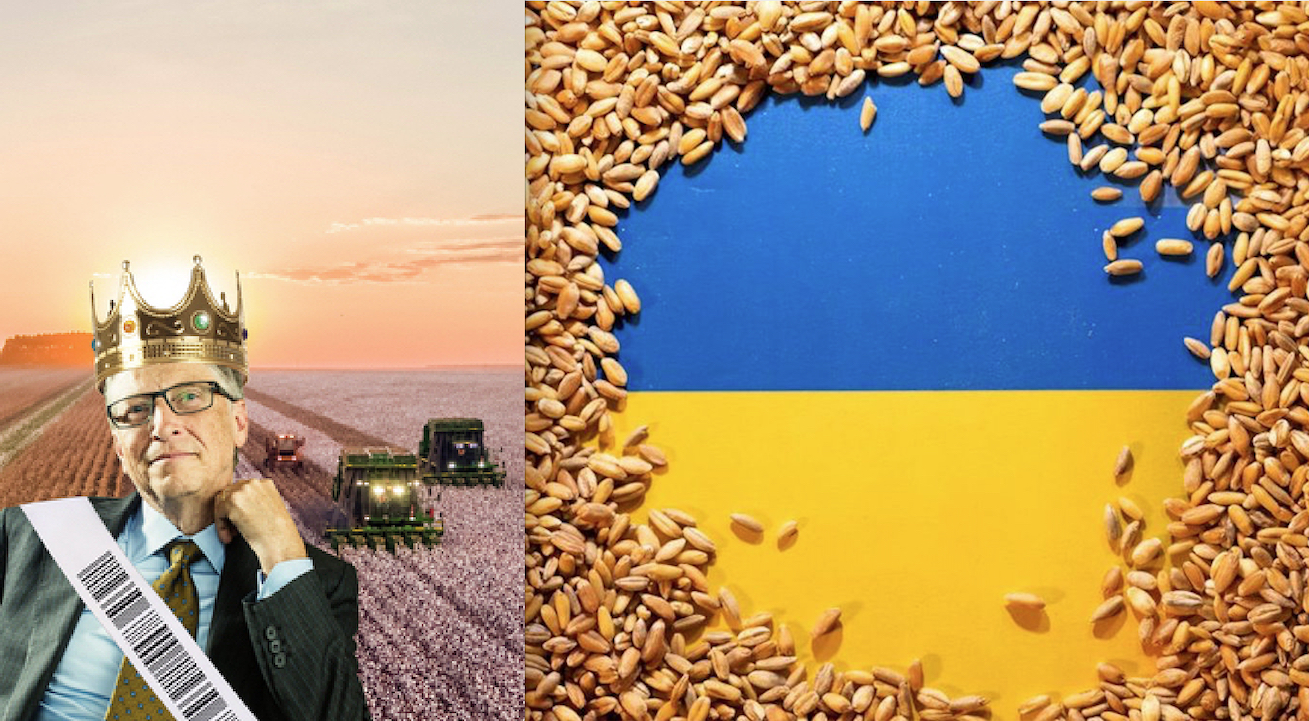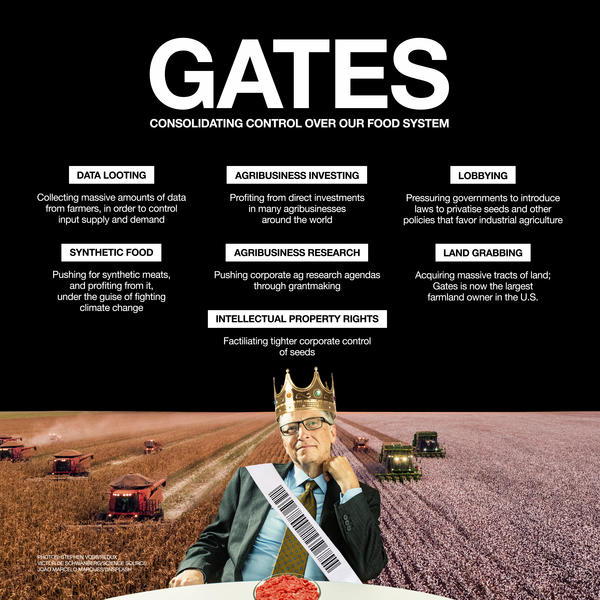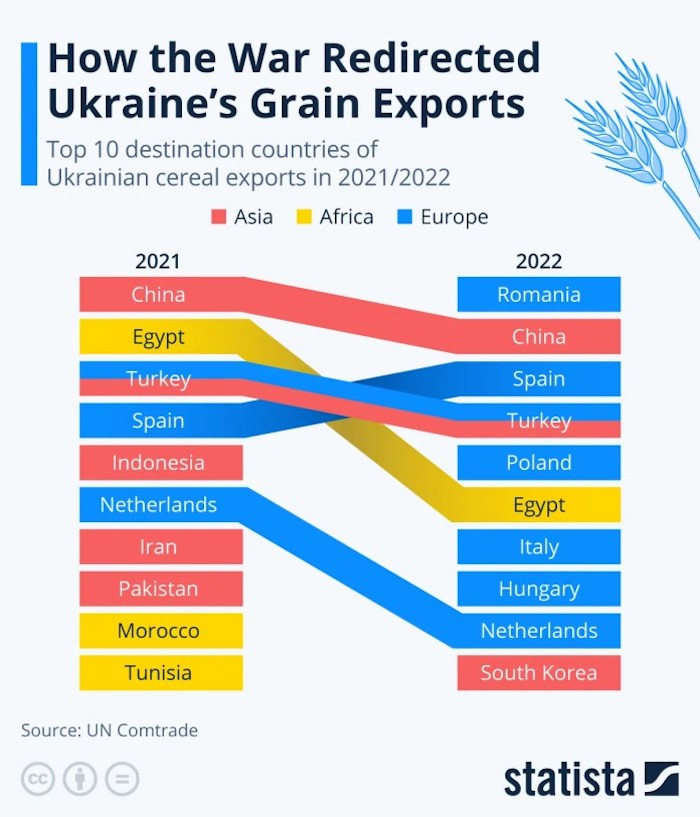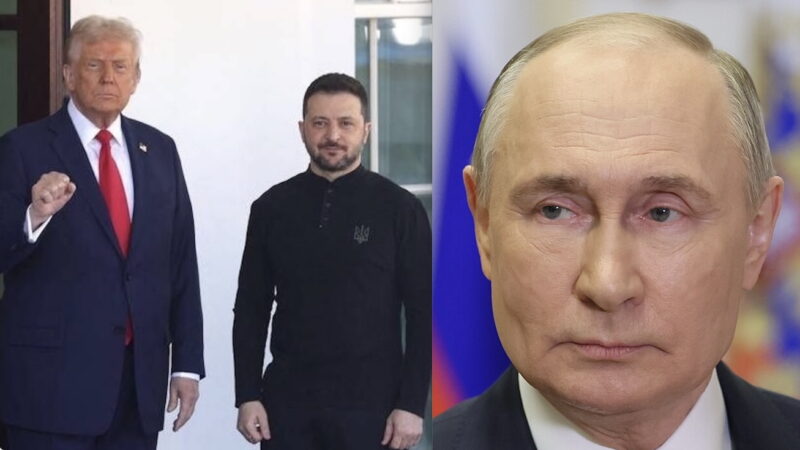European Countries’ Grain-Food Warfare against Ukraine. Specter of Gates’ Huge Agricultural Speculation

UPDATE ON MAY, 3 2023
On Friday, the European Commission struck an agreement in principle with Poland, Bulgaria, Hungary, Romania and Slovakia that allows the transit of Ukrainian grain across their countries without any of it entering their domestic markets.
Prime Minister Mateusz Morawiecki claimed that Warsaw had played a key role in brokering the deal: “I am glad that our strong voice — a voice strengthened through five countries because I have built just such a coalition — has been heard in the European Union,” Morawiecki said.
But Ukraine is still angry, as President Volodymyr Zelenskyy made clear to European Council President Charles Michel on Friday.
“I expressed deep concern about such decisions and emphasized that these steps are a gross violation of the Association Agreement and the founding treaties of the EU,” Zelenskyy said, while the Ukrainian foreign ministry sent protest notes to the five countries.
Warsaw was unapologetic.
“We care first and foremost about the Polish farmer,” said Morawiecki, adding that “we want, on the one hand, to … favor the struggling Ukraine, and on the other hand to cooperate with the European Union.”
by Fabio Giuseppe Carlo Carisio
After the growing pressures suffered by some Western European countries, due to the huge stock of Ukrainian grain in storage sites and ports, which has caused the price of domestic products to collapse, 5 countries in the eastern area have launched protectionist policies.
The intervention of the EU followed with the proposal to adopt a second financial support package of 100 million euros for farmers who have suffered damage.
Then, according to Financial Times, Brussels is preparing emergency curbs on Ukrainian grain imports to five member states close to the war-torn country, bowing to pressure from Poland and Hungary after they took unilateral action to pacify local farmers.
The commission said it will only take action if governments drop their current measures, which they have yet to agree to do.
«It will do so by availing of a rarely used power, contained in the measure that liberalised trade with Ukraine, and limit the new safeguards to only a few member states rather than the whole bloc» explained FT.
But which will be the reaction of other EU grain producers as French, Germany, Italy and Spain?
In recent days, first Poland and Hungary, and then Romania, Slovakia and Bulgaria banned the import and transit of grain and other food products from Ukraine, due to the steep drop in prices of local products.
Then, since Friday, Romania and Poland are allowing Ukrainian food products to pass through their territory until the European Commission decides on the matter next week
On March “Von der Leyen got what was an urgent letter [from the governments affected] and if she had responded to it in two or three days rather than now, we probably would not have such a problem,” said Szymański, who now works for the Polish Economic Institute, a Warsaw think-tank.
Which is the reason for this unjustifiable and suspicious delay???
The Spectre of a Gates’ Huge Agricultural Speculation
Before reading the details of the issues on the ground we have to ask ourselves if there is not a strategic plan orchestrated by New World Order
, director of pandemic spread with a SARS-Cov-2 built in some CIA-Pentagon’s bio-labs, perhaps in Ukraine, and of the Kiev coup on 2014 before Donbass civil war and then NATO conflict against Russia.
As we highlighted in a previous investigation, an analysis by Open Democracy published in October revealed that ten private companies controlled 71 percent of the Ukrainian agricultural market, including, “in addition to the Ukrainian oligarchy, multinational corporations such as Archer Daniels Midland (ADM), Bunge, Cargill, Louis Dreyfus, and the Chinese state-owned company COFCO.”
Escalation Plot: Dutch Intelligence Report points to Threat of “Russia War with West”
According to the Oakland Institute’s latest report on the subject, the list now also includes multinational corporations such as Luxembourg-based Kernel, the US holding company NCH Capital, the Saudi-based Continental Farmers and the French AgroGenerations,
As focused by Grain.org there are another king of NWO who is speculating on this sector and he can have interests to weaken European farmers: Bill Gates.
«The Bill and Melinda Gates Foundation has spent nearly US$6 billion over the past 17 years trying to improve agriculture, mainly in Africa. This is a lot of money for an underfunded sector, and, as such, carries great weight. To better understand how the Gates Foundation is shaping the global agriculture agenda, GRAIN analysed all the food and agriculture grants the foundation has made up until 2020. We found that, while the Foundation’s grants focus on African farmers, the vast majority of its funding goes to groups in North America and Europe» explained Grain.org.
We have to recall that Gates is the ring of connection among Big Pharma of Covid vaccines and Weapons Lobby which are growing Ukraine War.
For all these reason may be that a a big speculation in ongoing across European Unione, already lobbied on vaccines by Gates’ NGO, also in the agricultural market. So the reaction of the EU countries on grain and food affairs may have many geopolitics Reflections on the NATO-led war in Ukraine.

«Of course, the Gates Foundation is about much more than just making grants. The Foundation’s Trust Fund, which manages the Foundation’s endowment, has big investments in food and agribusiness companies, buys up farmland, and has equity investments in many financial companies around the world. These, and other activities of Gates in the area of food and agriculture, are illustrated in the infographic that accompanies this report» added Grain.org.
For these reasons Gates is not afraid due to the use in Ukrainian war of depleted uranium weapons promised by UK to the Kiev regime which can devastate agricultural system for dozen of years???
Now let’s go to analyze the focus of grain-food European warfare.
Ukrainian Grain devaluated the Local Agricultural Commodities
Due to the Russian invasion, which led to the blockade of some Black Sea ports, large quantities of Ukrainian grain were sent to neighboring countries, causing logistical bottlenecks and accumulations of grain in storage silos.
This has resulted in a devaluation of the price of local agricultural commodities and has created pressure for Eastern European countries such as Poland, Slovakia, Hungary and Romania, which are looking to transfer grain to other parts of the world.
Most recently Bulgaria, with a protectionist manoeuvre, has joined Poland, Hungary and Slovakia in the temporary ban on imports of cereals from Ukraine, to protect national production.
The European Commission has rejected bans introduced by Poland and Hungary on Ukrainian grain imports. The two countries said the measures were necessary to protect their farming sectors from cheap imports.
The ban applies to grains, dairy products, sugar, fruit, vegetables and meats and will be in force until the end of June. The Commission said it was not up to individual member states to make trade policy. While the Commission has said that unilateral moves will not be tolerated, it has not yet specified what measures it would take against Poland and Hungary.
On April 14, Bulgaria, Hungary, Poland, Romania, Slovakia and the Czech Republic called for the creation of a single European mechanism for the purchase of Ukrainian grain and the introduction of customs quotas in the EU for agricultural products from Ukraine.
This was the latest attempt by these countries to curb the arrival of cheap grain from Ukraine into their agricultural markets, thus jeopardizing domestic production.
But in the face of yet another evasive response from the European Commission, import blocks have been triggered.
The Warning Ignored by European Commission
Already last February, in fact, during the meeting of EU agriculture ministers held in Brussels, the serious problem was signaled by a joint document presented by Poland, Hungary, Bulgaria, Romania, the Czech Republic and Slovakia.
They had remarked that the goal of channeling Ukrainian agricultural products towards the world market had failed, as also reaffirmed by the UN which had expressed concerns for the poorest countries in Africa.
Eastern Europeans had highlighted that “the land transport of Ukrainian corn to Western Europe is largely unprofitable, as a result the grain is replacing domestic products such as low-cost animal feed in the Eastern European countries bordering Kiev cost”.
The “solidarity lanes” would therefore have caused a series of damages, as well as benefits for the Kiev government. However, Brussels has always denied this evidence.
“There is no destructive or negative impact of Ukraine’s exports on EU markets. We don’t see any collapse in terms of prices due to this export from Ukraine,” the EU Agriculture Commissioner told reporters. Janusz Wojciechowski at a press conference.
Romania has a completely different opinion. According to Florentin Bercu of the Romanian Alliance for Agriculture and Cooperation, Romanian agricultural producers have suffered a “strong deterioration in their competitiveness”.
“At the peak of the harvest, the local grain and oilseed market is satisfied with Ukrainian grain, thus causing the grain market in Romania to collapse, both in terms of purchase prices and in terms of volumes required,” Bercu explained.
The Ukraine Huge Production of Grain and Corn
Ukraine produces approximately 36 million tons of corn for animal feed (5th place in the world) and 25 million tons of soft wheat for bread production (7th place in the world).
Every year Ukraine produces over 10% of the soft wheat used for bread making in the world, essential for guaranteeing the food survival of over 400 million people especially in North Africa and the Middle East. At the top of the ranking of states that draw on the Ukrainian granary there is undoubtedly Egypt, which buys 3.62 million tons a year, while second place goes to Indonesia, with 3.22 million tons a year . Equally dependent on wheat imports from Ukraine are Bangladesh, with 2.3 million tons, Turkey at 1.19 million, while Yemen buys 1.06 million and the Philippines 1.02 million tons.
As far as corn is concerned, however, Europe does not seem to have any rivals in terms of imports. Out of 4.4 million tons of product, EU ports have received more than 60% of Ukrainian maize. 30% instead reached the ports of Asia and 10% those of Africa. Nationally, Spain takes 20% of corn shipped from Ukrainian ports, while Italy is second in this ranking with 14% of total exports. China closes the podium with 11%, followed by Turkey and the Netherlands with 10%.
How the War Redirected Ukraine’s Grain Exports
and the temporary blockage of its Black Sea ports have redirected the flow of grain from Ukraine. One of the world’s leading producers of wheat, corn and vegetable oils, Ukraine shipped much of its grain internationally prior to the war, with seven of the 10 most important destination markets for Ukrainian grain exports in 2021 located in Asia and North Africa (eight when including Turkey)».
This has been reported by Statista.

That changed drastically in 2022, as the following chart illustrates. According to data from the UN Comtrade database, much of Ukraine’s grain exports ended up in Europe last year, with Romania, Poland and Hungary seeing particularly large increases in inflows of grain from their embattled neighbor. Meanwhile, Indonesia, Iran, Pakistan, Morocco and Tunisia all dropped out of the top 10, as the flow of Ukrainian exports via maritime trade was severely disrupted.
Fabio Giuseppe Carlo Carisio
© COPYRIGHT GOSPA NEWS
prohibition of reproduction without authorization
follow Gospa News on Telegram
Poland wants broader Ukrainian food ban
Originally published by Russia Today
Poland wants to expand import restrictions on Ukrainian foodstuffs by adding berries, eggs, poultry, sugar, and honey, a Polish outlet has claimed. Several Eastern European nations targeted Ukrainian grain after it flooded the market and drove local prices down.
Warsaw’s push for wider restrictions was reported on Thursday by the RFM radio station, which cited unofficial information uncovered by its reporter in Brussels. Hungary has already banned Ukrainian eggs, meat, sugar, cooking oil, wine, and most kinds of vegetables.
Poland, Hungary, Romania, Slovakia, and Bulgaria banded together to keep Ukrainian food products out of their markets, sparking irritation in Brussels. A European Commission spokesperson said last Sunday that “unilateral actions” were not acceptable and that member states should “align all decisions within the EU.”
Last year, the EU lifted tariffs and quotas for Ukrainian agricultural products and worked to facilitate these goods being exported, purportedly to help Kiev in its fight against Russia. Eastern European nations, in particular Poland, have been supporting Kiev’s war effort but have faced domestic protests as farmers have struggled to compete with cheaper imports.
READ MORE: EU pledges support for states flooded with Ukrainian grain – Politico
On Wednesday, EU officials met with representatives from the five countries to discuss their concerns. The European Commission offered €100 million ($109 million) in support for farmers in the five member states, nearly twice the amount previously allocated for the purpose. It also vowed to take “preventive measures” regarding wheat, maize, oilseeds and sunflower seeds.
The crisis has subjected Ukraine’s bid to join the EU to a “reality check,” the Financial Times noted in a newsletter on Thursday. Ukraine is a major agricultural power, and membership would give it better access to the joint EU market. The FT said the standoff exposed “the gulf between political positioning and market realities” and that accession “remains a distant prospect at best” for Kiev.
Bulgaria to temporarily ban imports of products from Ukraine from April 24
Originally published by TASS Russian News Agency
The technical government of Bulgaria has decided to ban import of a number of products from Ukraine from April 24 to June 30. Bulgarian Agriculture Minister Yavor Gechev announced this at a briefing following the meeting of the Cabinet of Ministers.
“Today, a decision has been made to temporarily restrict the import of a number of Ukrainian products to Bulgaria. Bulgaria followed the example of three other states, fearing that our grain market is oversaturated. We have accumulated grain worth several billion, if we don’t take action, we won’t be able to sell it,” Gechev explained adding that the ban will not affect the so-called corridors of solidarity, through which grain is sent to third countries in transit through Bulgaria.
“Our support for Ukraine continues, we communicate daily with the European Commission. There is an understanding that this issue is very important for us. 16% of the country’s citizens are engaged in agriculture, and we cannot allow their work to be questioned,” Economy Ministry Nikola Stoyanov added.
He stressed that the European Commission must ensure that “corridors of solidarity are corridors of transit.”
Earlier, Prime Minister Galab Donev announced that the government would decide on a temporary ban on the import of a number of products from Ukraine due to the fact that significant amounts of food from this country remained in Bulgaria, disrupting the main production and trade chains, causing serious damage to the Bulgarian business.
“Bulgaria remains in solidarity with Ukraine, but the bankruptcy of Bulgarian agricultural producers will not help it in any way,” Donev added.
On April 14, Bulgaria, Hungary, Poland, Romania, Slovakia and the Czech Republic called for the creation of a single European mechanism for the purchase of Ukrainian grain and the introduction of customs quotas in the EU for agricultural products from Ukraine.
On April 16, Hungary and Poland announced a ban on the import of agricultural products from Ukraine, which will be in effect until June 30. Both countries noted that they were forced to resort to this measure due to the lack of response from the European Commission to their demands to provide EU assistance to Hungarian and Polish farmers.
They suffer significant losses due to the overstocking of the markets of their countries with Ukrainian agricultural products. On April 17, the Slovak government introduced a similar restriction.
MAIN SOURCES
GOSPA NEWS – WEAPONS LOBBY DOSSIER



